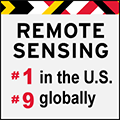Program Overview
The Online MS in Geospatial Information Sciences (GIS) and MS in Geospatial Intelligence (GEOINT) programs in the Department of Geographical Sciences have earned the #2 spot in GISDegree.org's 2025 ranking of the best online Master’s programs in GIS and GEOINT.
The department of Geographical Sciences has been ranked #1 in the US for Remote Sensing by Shanghai Ranking.
Graduate Programs in Geospatial Information Sciences provide advanced education and training of the most up-to-date knowledge and skills of geospatial technology including GIS, remote sensing, and computing. Employers recognize the demand for well-trained GIS professionals who can apply concepts and practices of GIS application development on web and mobile platforms. GIS is a software application system that has a wide range of application areas such as transportation logistics, network analysis, emergency management, urban planning, and environmental research.
Graduate Programs in Geospatial Information Sciences are offered through the Department of Geographical Sciences in the College of Behavioral and Social Sciences. The programs provide the most up-to-date education on geospatial technology, theory and applications. For additional information, see
Graduate Programs in Geospatial Information Sciences offers an in-person and a 100% online learning option for each program. (Remote Sensing is the exception). Depending on the specific subject area, the curriculum is identical for each delivery option. Designed for working professionals, students can earn a University of Maryland degree while continuing to work full-time with minimal disruption to personal and professional life. Full-time or part-time study is welcomed.
Graduate Programs in Geospatial Information Sciences offers the following programs. Students who successfully complete requirements for a graduate certificate may apply these credits towards the Master of Science if the student applies and is admitted. Students with specific academic questions may contact Kristen Halliday, Assistant Director, via email: khallida@umd.edu.
Master's Programs
Master of Science in Geospatial Information Sciences
- Provides state-of-the-art training in spatial analysis, statistics, programming, databases, modeling, remote sensing, Internet GIS, Mobile GIS, and Open Source GIS. Learn more.
Certificate Programs
Graduate Certificate in Geospatial Information Sciences
- Provides specialized training in GIS and in the application of geospatial technologies, specifically geographic information systems, remote sensing, spatial analysis, and modeling. Learn more.
Graduate Certificate in Remote Sensing
- Covers all major aspects of remote sensing including digital image processing and analysis; working with Lidar, drones for data collection, and computer programming that is critical for data processing and analysis. Learn more.

